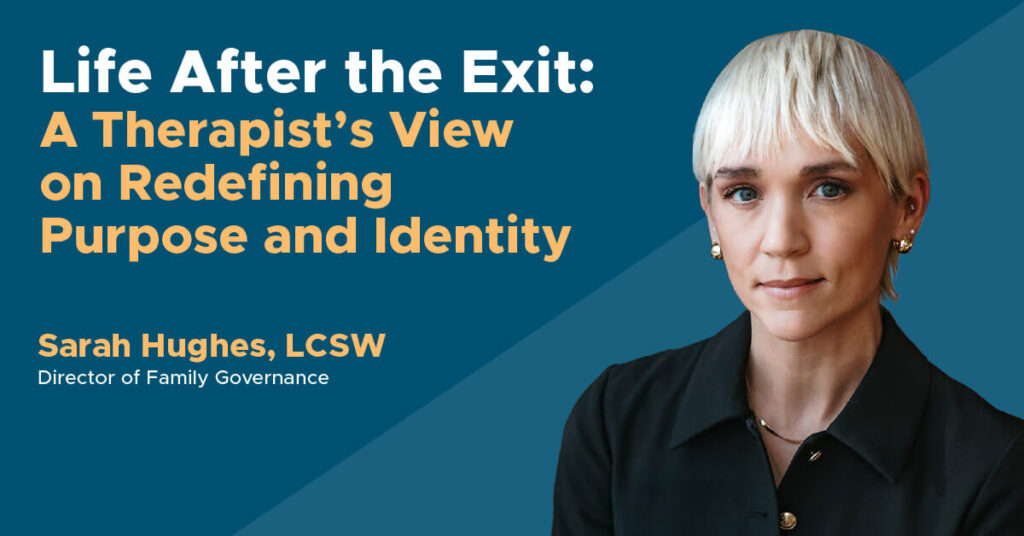
By Sarah Hughes, LCSW, Director, Family Governance, Cresset
Selling a business is typically imagined as a moment of fulfillment—a celebration of years of sacrifice, risk, and relentless focus. Yet for many founders, especially younger ones, the period after the sale can be surprisingly complex. An absence of urgency, structure, and clear purpose can leave even the most accomplished entrepreneurs feeling unmoored.
As a therapist and coach who works with founders and families of wealth, I’ve seen that while financial independence is liberating, it also presents somewhat of a psychic vacuum, with unexpected and even paradoxical emotional and relational challenges. After a sale, the question shifts from “What am I building?” to “What do I do now?”
Redefining Success After the Exit
Millennial and Gen Z founders are redefining what success looks like. A 2024 Deloitte study found that 70% of younger entrepreneurs value purpose alignment over wealth accumulation when making major career decisions.
That shift shows up in their choices post-sale. Some move closer to parents or family after years apart, while others reengage with entrepreneurship as mentors. A few even take long-postponed travel sabbaticals, like one founder who finally unplugged for a week in remote Alaska, something impossible during his years of nonstop growth and the 24-hour need to be connected to his team. For those who are planful, life after a sale does not have to mean stepping back but leaning into what feels meaningful.
The Emotional Vertigo of Freedom
Financial freedom is exhilarating, but it also removes motivational structure that once transcribed daily life. A Harvard Business Review survey found that more than 40% of founders experience emotional turbulence after a liquidity event, ranging from restlessness and anxiety, to identity crisis.
One founder described it as “going from 120 miles per hour to standing still overnight.” The high of the deal is often followed by a quiet and even lonely space for reckoning: What now? Who am I without my company?
Founders who navigate these existential questions well tend to treat the transition not as an ending but as a progression. Therapy, coaching, and reflection provide space to process the loss of routine and discover identity outside of achievement.
Designing a Balanced “Portfolio Life”
The healthiest post-sale lives are those designed thoughtfully, integrating curiosity, contribution, and rest. Among younger founders, “portfolio life” increasingly means designing for flexibility. Some work only mornings, reserving afternoons for family or outdoor pursuits. Others structure their post-exit years around part-time board roles, direct investments, or coaching engagements. A planning approach helps these entrepreneurs define what true financial independence means, enabling them to work because they want to, not because they have to.
This diversified approach mirrors what entrepreneurs already understand about portfolio strategy: balance and diversification reduce volatility. When founders diversify their sources of purpose—intellectual, relational, physical, and creative—they build in resilience and positive outcome.
Navigating the Transition
Even with planning, there will always be challenges after a sale. For many founders, this period coincides with a broader midlife transition, where the excitement of entrepreneurial life fades, depression can surface, and deeper questions about identity and purpose emerge. Others face relationship challenges with co-founders or spouses as roles and dynamics shift. Connecting them with peer mentors or professional coaching support can help normalize this transition and rebuild purpose beyond the business.
Restoring Structure and Meaning
After the sale, it’s essential to establish routine. For years, founders’ lives have been structured by urgency. But suddenly, there are no investor calls or projects demanding their time. That absence can feel like emptiness.
Establishing new rituals helps restore meaning. Some clients find engagement through travel, philanthropy, or learning. Others reintroduce small habits—consistent exercise, community involvement, time outdoors – that rebuild momentum. The goal is not to replicate the intensity of entrepreneurship, but to engage in activities that fuel fulfillment.
The “No Regrets” Mindset
A central theme I explore with clients is the idea of a “no regrets” transition—making thoughtful, values-aligned decisions that lead to satisfaction, not second-guessing:
- Pause before committing. Take time to examine your motivations before jumping into the next venture
- Clarify your financial independence number. Know what economic freedom means for you, so your time decisions are guided by purpose, not fear
- Reconnect intentionally. Relationships often shift after a sale; communicate openly about new priorities and needs
- Seek reflection partners. Coaches, therapists, and peers can help normalize and process the complexity of this moment
Building the right team of M&A and personal advisors early in the process helps minimize regret and create smoother transitions. Peer mentorship can be invaluable as entrepreneurship can be isolating, and sharing often brings perspective.
Where Wealth and Well-Being Intersect
Life after a sale doesn’t exist separately from wealth; it exists because of it. The same resources that create optionality can also support deeper alignment between money and meaning.
Philanthropy can become an expression of purpose. Family office structures can support flexibility, education, and governance across generations.
When managed well, wealth planning becomes life planning. It enables founders to live not just comfortably, but consciously, to ensure their resources support the kind of well-rounded life they desire.
